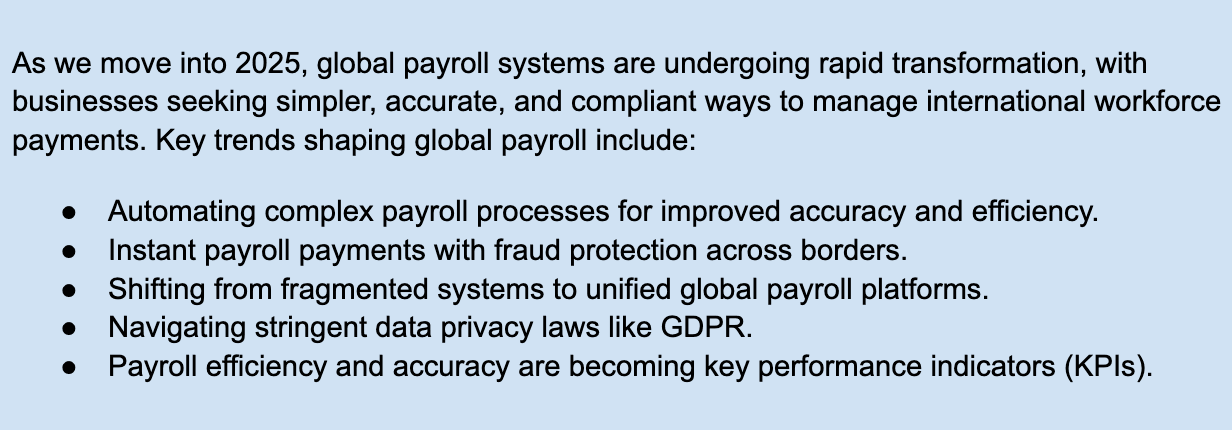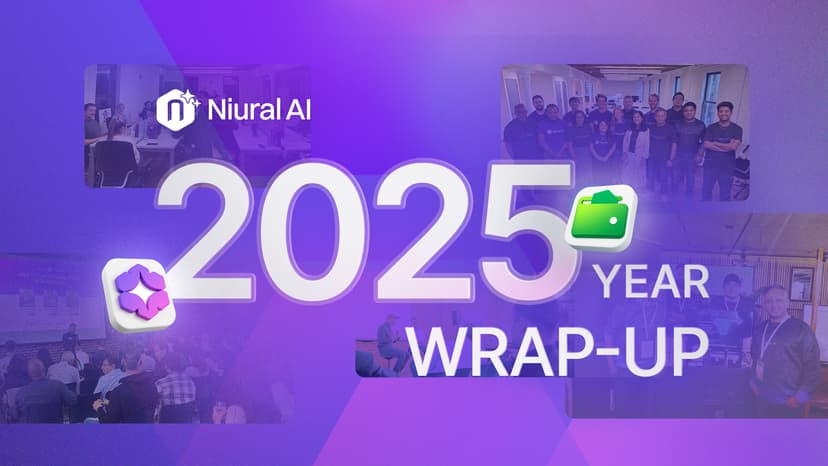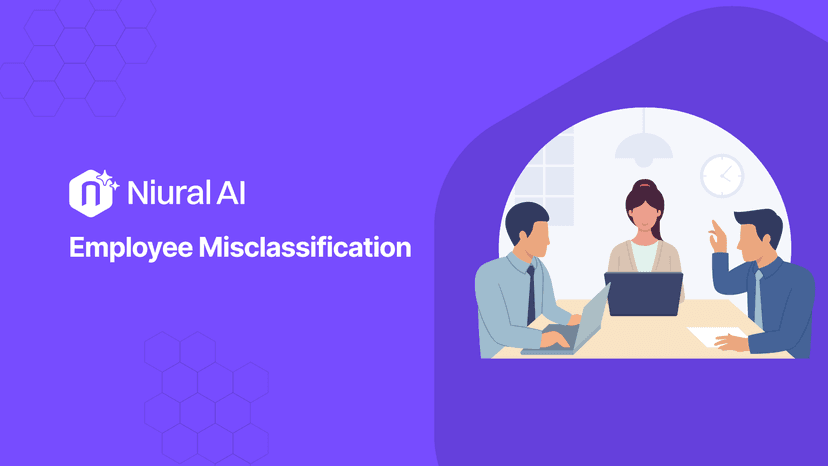Executive Summary

Global payroll is undergoing a significant transformation in 2025, driven by technological advancements and evolving regulatory requirements. As companies expand their workforce across multiple countries, managing payroll has become an increasingly complex task. Payroll leaders are now tasked with ensuring efficiency, security, and real-time payment capabilities across diverse jurisdictions. From the rise of AI-powered automation to the adoption of real-time pay systems, By understanding these trends, HR and finance leaders can make informed decisions on modernizing their payroll processes.
Learn about Niural’s Global Payroll.
AI Moves from Pilots to Production
Where it Works Now
AI is moving from experimental use cases to core payroll functionality. Today, many payroll systems, like Niural, use AI for tasks such as anomaly detection, intake validation, approvals, and automated statutory payment reminders by jurisdictions. AI can quickly spot discrepancies in payroll calculations, flagging potential errors before they become costly mistakes. With AI-driven tools like Niural's EMMA AI co-pilot, HR teams can automate repetitive tasks, reducing the time spent on manual reviews and ensuring that payroll is processed accurately and on time.
Guardrails
As AI becomes more deeply integrated into payroll workflows, ensuring data security and compliance is paramount. Payroll systems must provide robust audit trails and ensure protection to meet stringent regulations like the GDPR. Additionally, AI systems should be explainable, meaning businesses can trace AI-driven decisions and understand how they were made, providing transparency and accountability.

Technology can transform crucial business tasks like payroll, making them far more efficient. (Source: Pexels)
Real-Time & Cross-Border Payroll Payments
Faster Rails & Wallets
Real-time payroll payments are no longer a distant concept. Automated payment systems have gained traction, improving payment speed and security globally. Platforms like Niural offer real-time payments in both fiat and cryptocurrency, providing businesses with flexibility and transparency. This can significantly reduce payment delays, ensuring employees are paid on time, no matter where they are based.
Fraud prevention is another critical aspect of real-time payments. Advanced fraud detection algorithms now run alongside payroll processing systems, identifying suspicious activity before funds are disbursed, thus minimizing the risk of financial loss.
On-Demand Pay vs. Compliance
While on-demand pay systems are gaining popularity due to their ability to provide workers with instant access to wages, they pose compliance challenges. Companies must navigate complex local labor laws, ensuring that on-demand pay systems do not violate tax withholding requirements or payroll reporting rules. Businesses must also be aware of how on-demand pay impacts benefits eligibility and other employment-related matters. Niural’s platform helps mitigate these issues by ensuring that real-time pay systems are compliant with local tax and labor laws.
Learn about Niural’s Global Payroll.
Consolidation: From Patchwork to Unified Platforms
Drivers
Businesses are increasingly moving toward consolidated global payroll platforms to simplify operations. Instead of relying on multiple vendors for each country, companies are embracing unified platforms like Niural that provide a single source of truth for all payroll data. This consolidation reduces exceptions, improves visibility, and optimizes operations.
By using a unified platform, HR and finance teams benefit from better data accuracy, smoother workflows, and a clearer understanding of the overall payroll ecosystem across different regions. Niural’s platform unites payroll and HR data, reducing administrative overhead and mitigating the risks associated with fragmented payroll systems.
Privacy, Residency & Controls
GDPR, In-Product Audit Trails, Lawful Basis, Access Controls
Data privacy continues to be a major concern for global payroll, especially in light of stringent regulations like the GDPR. With payroll systems storing sensitive employee data, businesses must implement strong security measures, including in-product audit trails and access controls. Niural’s privacy-first design ensures compliance with GDPR and other global data protection laws, offering secure data storage and encryption to protect sensitive information.
Platforms like Niural continuously update their security features to align with local data protection laws, ensuring that employee data is handled responsibly across different jurisdictions. This proactive approach to data security helps businesses avoid costly fines and reputational damage. Niural holds a SOC 2 Type 2 certification, demonstrating its commitment to safeguarding sensitive information and ensuring that its data management practices meet the highest standards for security, availability, processing integrity, confidentiality, and privacy.
Analytics & Accuracy as Board-Level Metrics
KPIs
As global payroll becomes more integral to business operations, payroll performance metrics are gaining importance at the board level. Key performance indicators (KPIs) like
- Cycle time
- Accuracy
- First-pass yield
- Exception rates
With Niural, businesses can measure payroll performance in real-time through unified dashboards that provide insights into payroll costs, tax liabilities, and workforce data. This enables companies to make more informed decisions, identify areas for improvement, and enhance overall payroll efficiency.

Modern teams are global, and your payroll processes must support that.
What to Do Next (2025 Roadmap)
90-Day Plan
For businesses looking to modernize their global payroll systems in 2025, the following roadmap provides a practical guide:
- Define KPIs: Establish a baseline for payroll metrics such as accuracy and cycle time.
- Map Current Vendors: Review existing payroll vendors and identify gaps.
- Identify Quick Wins: Implement simple improvements, such as consolidating payroll systems in a few regions, to reduce inefficiencies and errors.
Build vs. Buy Checklist
When deciding whether to build an in-house payroll solution or buy a third-party platform, companies should consider:
- Scale of Operations: If operating in more than five countries, consider purchasing a consolidated solution like Niural.
- Compliance Needs: If compliance with global tax laws is a priority, a third-party platform with built-in compliance features is crucial.
- Customization: If the business requires specific customization that off-the-shelf platforms cannot provide, building an in-house solution might be more suitable.
In 2025, the landscape of global payroll is rapidly evolving, with businesses embracing AI, real-time payments, and unified platforms to simplify operations and ensure compliance. As HR and finance leaders work to modernize their global payroll systems, they must focus on the integration of these technologies to drive efficiency, reduce risks, and improve employee satisfaction.
By adopting AI automation, enhancing payment systems, consolidating payroll vendors, and prioritizing data privacy, businesses can confidently manage their global payroll processes and remain compliant in an increasingly complex regulatory environment. The trends of 2025 offer businesses a clear path forward to modernize payroll, simplify workflows, and set a solid foundation for global growth.



